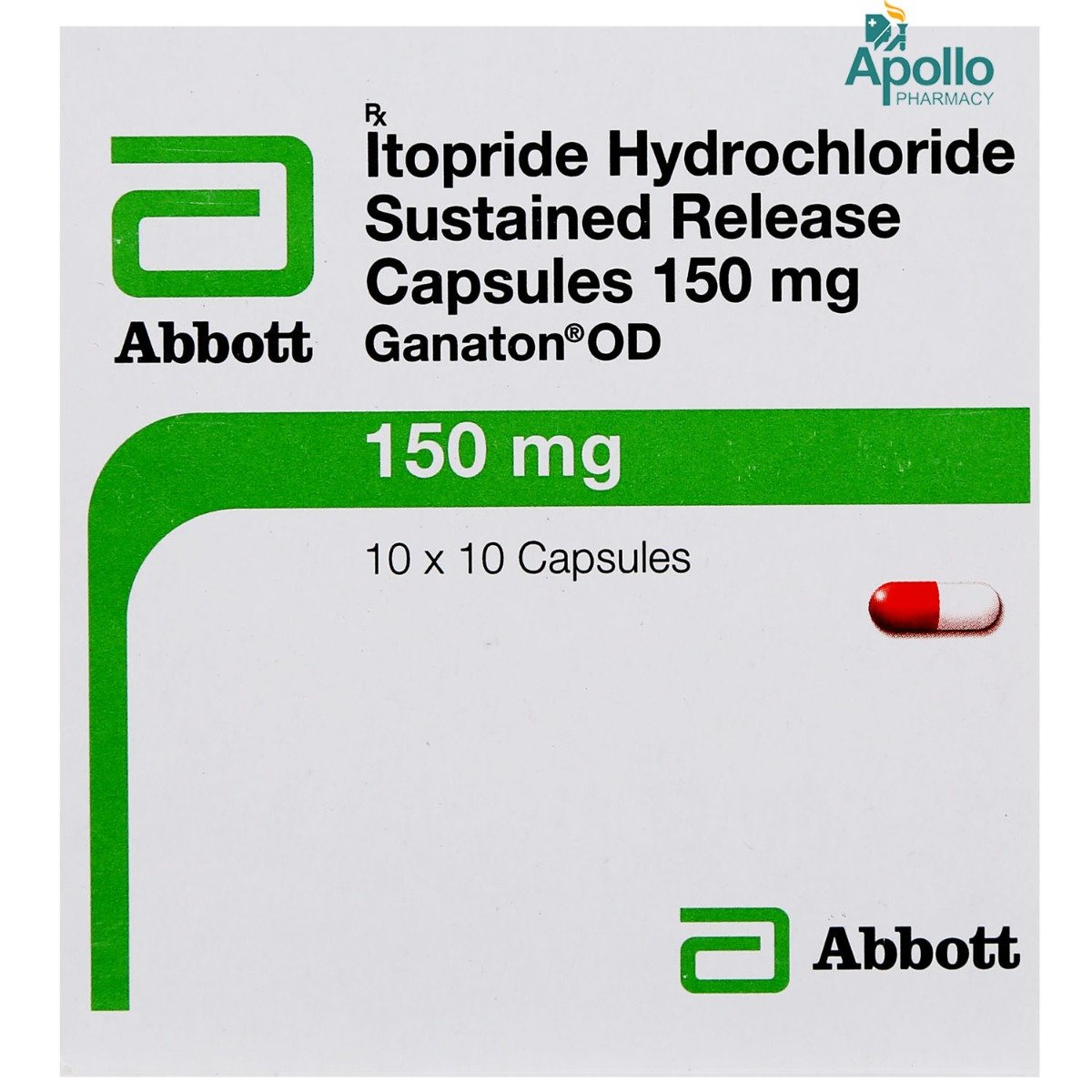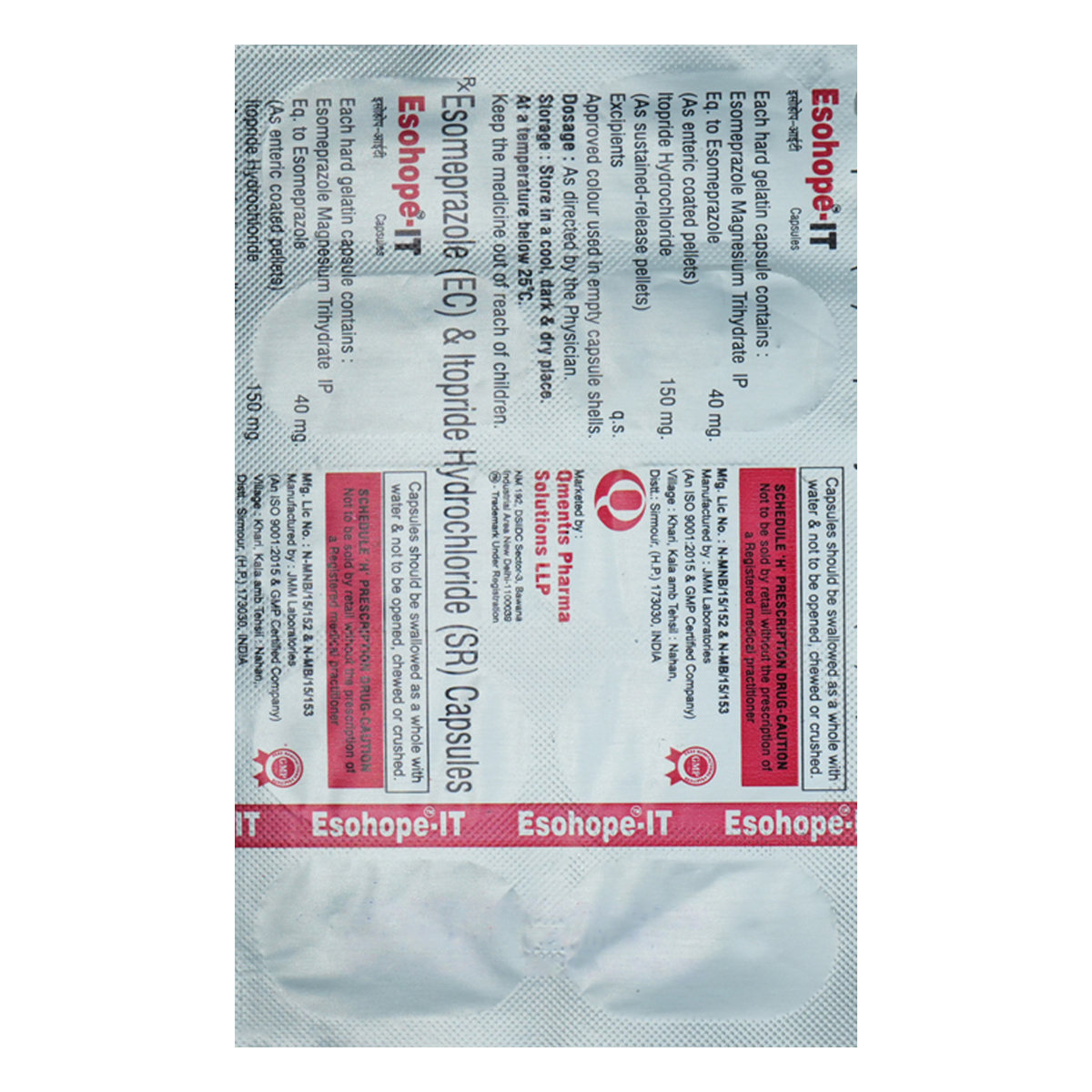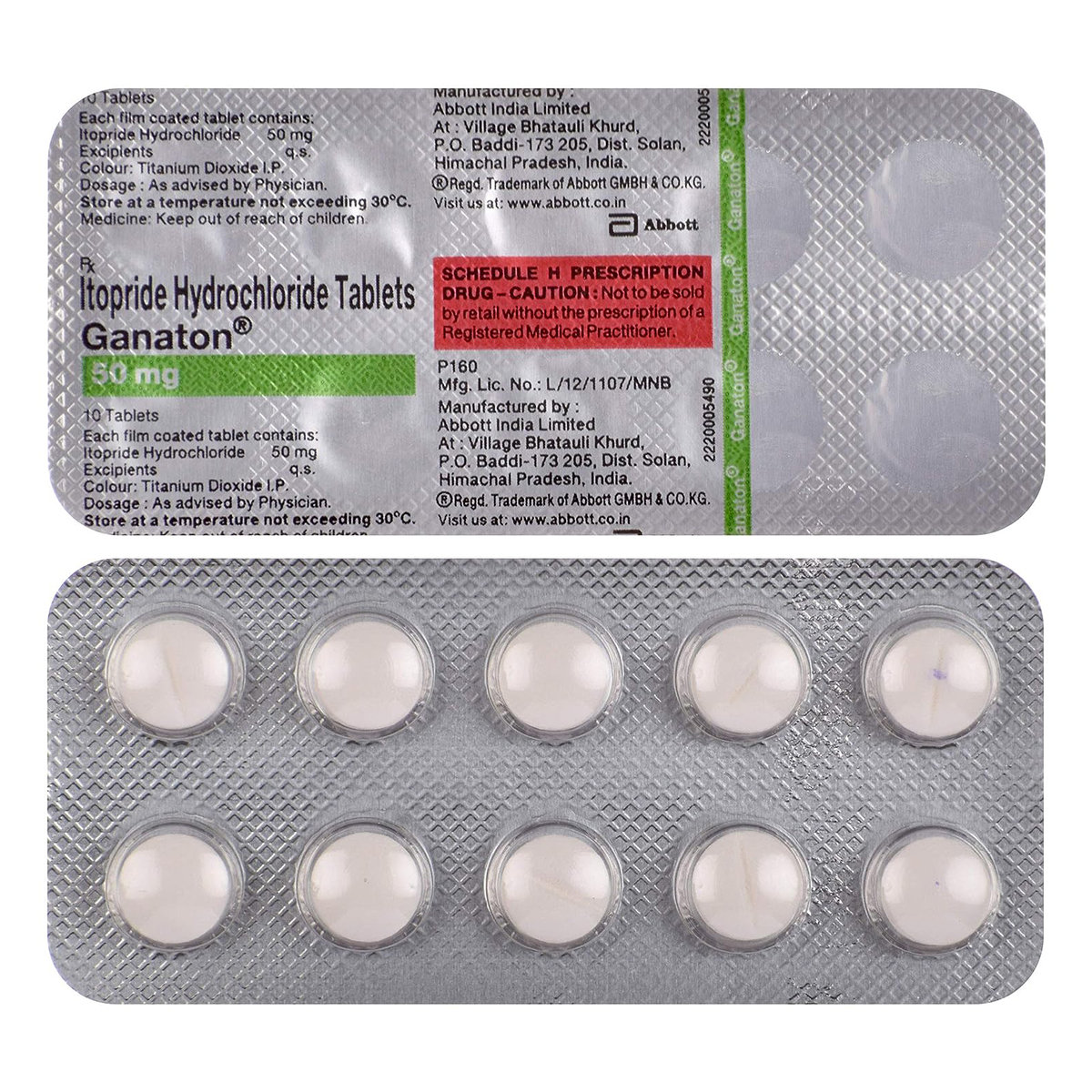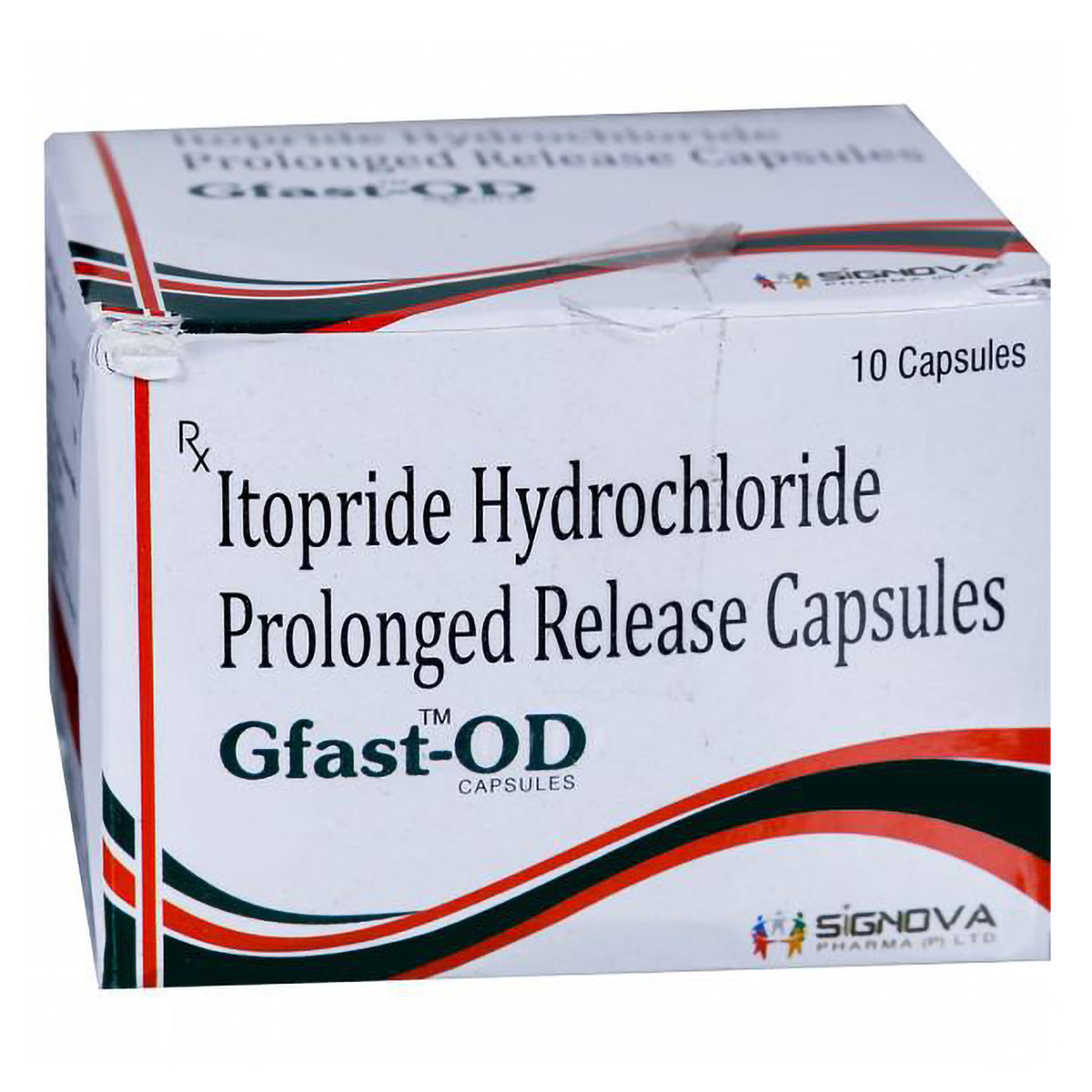Itopride Hydrochloride
About Itopride Hydrochloride
Itopride Hydrochloride belongs to a class of drugs called 'gastroprokinetic agent, gastrokinetic agent or propulsive' primarily used in treating the disorders associated with reduced gastrointestinal motility. Besides this, Itopride Hydrochloride also treats gastrointestinal disorders like dyspepsia (indigestion), bloating (feeling of stomach tightness due to gas), upper abdominal pain, anorexia (eating disorder), heartburn, nausea and vomiting. In the normal digestion condition, the food is moved through the entire digestive tract (food pipe, stomach, small intestine and large intestine) by a rhythmic contraction, i.e. peristalsis movement. This regular movement of the digestive tract is called 'gastric motility.' When an individual suffers from a digestive motility problem, these digestive tract contractions do not work properly, leading to various gastrointestinal issues.
Itopride Hydrochloride contains 'Itopride Hydrochloride' that increases the level of acetylcholine concentration, increasing the Gastrointestinal peristalsis movement, thereby accelerating gastric emptying time and easing the movement of food through the entire gastrointestinal tract. Itopride Hydrochloride also stops the sensation of vomiting/nausea by blocking the D2 receptors located in the chemoreceptor trigger zone - CTZ of the brain responsible for inducing vomiting.
Your doctor will advise you on how often you take your pills based on your medical condition. You may sometimes experience diarrhoea, stomach pain, headache, tremor (involuntary movement) and drowsiness. Most of these side effects of Itopride Hydrochloride do not require medical attention and gradually resolve over time. However, if the side effects persist or worsen, please consult your doctor.
If you are known to be allergic to Itopride Hydrochloride or any other medicines, please tell your doctor. Itopride Hydrochloride is not recommended for children below 16 years of age. If pregnant or breastfeeding, please inform your doctor before taking the Itopride Hydrochloride. If you have Parkinson's disease or internal bleeding of the stomach and intestine, please consult a doctor before taking Itopride Hydrochloride. If you notice dark, coffee-coloured stools or blood in stools, contact your doctor immediately, as these might be signs of bleeding in the stomach.
Uses of Itopride Hydrochloride
Medicinal Benefits
Itopride Hydrochloride is a gastroprokinetic agent (enhances the movement of food from the mouth through the stomach and intestines) that is used for treating gastrointestinal symptoms such as heartburn, vomiting, nausea, bloating (stomach feels swollen due to build-up of gas), non-ulcer dyspepsia (indigestion), discomfort or pain in the abdomen. Itopride Hydrochloride prevents heartburn by enhancing the movement of food through the stomach and intestines. Also, Itopride Hydrochloride acts on the brain's chemoreceptor trigger zone (the area that triggers vomiting) and prevents vomiting.
Directions for Use
Storage
Side Effects of Itopride Hydrochloride
- Leukopenia (low level of white blood cells in the blood)
- Thrombocytopenia (low number of platelets in the blood)
- Anaphylactoid reaction (severe allergic reaction)
- Increased prolactin level
- Gynecomastia (swelling of breast tissue in males)
- Dizziness
- Headache
- Tremor (involuntary movement)
- Diarrhoea
- Constipation
- Increased saliva
Drug Warnings
Patients with reduced kidney or liver functions should be monitored carefully, and the dose should be adjusted accordingly. Itopride Hydrochloride may be excreted in breast milk. Therefore, breastfeeding or pregnant women are advised to consult a doctor before taking Itopride Hydrochloride. If you notice dark, coffee-coloured stools or blood in stools, contact your doctor immediately, as these might be signs of bleeding in the stomach. Do not take Itopride Hydrochloride if you have increased gastrointestinal haemorrhage (internal bleeding of intestine and stomach), gastrointestinal motility (movement of food from the mouth through stomach and intestine), mechanical perforation or obstruction, as it may worsen the condition.
Drug Interactions
Drug-Drug Interactions: Itopride Hydrochloride may interact with anticholinergic agents (dicyclomine, trihexyphenidyl, ipratropium, belladonna alkaloids, benztropine mesylate, flavoxate, atropine, scopolamine and hyoscyamine).
Drug-Food Interactions: Itopride Hydrochloride may interact with grapefruit juice. Therefore, avoid consuming grapefruit juice with Itopride Hydrochloride as it may increase the risk of adverse effects.
Drug-Disease Interactions: Do not use Itopride Hydrochloride in patients with Parkinson’s disease, gastrointestinal bleeding, Lapp lactase deficiency, galactose intolerance or glucose-galactose malabsorption.
Drug-Drug Interactions Checker List:
Safety Advice

Alcohol
cautionThe interaction of alcohol with Itopride Hydrochloride is unknown. Please consult a doctor before consuming alcohol while using Itopride Hydrochloride.

Pregnancy
cautionLet your doctor know if you are a nursing mother before taking Itopride Hydrochloride; your doctor will decide whether Itopride Hydrochloride can be taken by breastfeeding mothers or not.

Breast Feeding
cautionLet your doctor know if you are a nursing mother before taking Itopride Hydrochloride; your doctor will decide whether Itopride Hydrochloride can be taken by breastfeeding mothers or not.

Driving
cautionItopride Hydrochloride may cause dizziness or reduce alertness in some people. So, drive only if you are alert after taking Itopride Hydrochloride.

Liver
cautionIf you have had a history or evidence of any liver-related diseases, please consult the doctor before taking Itopride Hydrochloride. Your doctor will weigh the benefits and any potential risks before prescribing it to you.

Kidney
cautionIf you have had a history or evidence of any kidney-related diseases, please consult the doctor before taking Itopride Hydrochloride. Your doctor will weigh the benefits and any potential risks before prescribing it to you.

Children
unsafeItopride Hydrochloride is not recommended for children below 16 years as the safety and effectiveness were not established.
Habit Forming
Diet & Lifestyle Advise
- Avoid certain foods such as tomatoes, coffee, chocolate, and spicy and fatty foods as they may cause heartburn or worsen the condition.
- Eat small portions of food frequently.
- Do regular exercise, such as for a minimum of 30 minutes daily. Maintain a healthy body weight, as obesity may also cause heartburn.
- Avoid consumption of alcohol and quit smoking.
- Avoid fast food, fried food, processed meats, refined carbs and added sugars.
Special Advise
- If you are suffering from rare hereditary Lapp lactase deficiency problems, galactose intolerance or glucose-galactose malabsorption, avoid taking Itopride Hydrochloride as it contains lactose.
Patients Concern
Disease/Condition Glossary
Gastric motility disorder: In the normal digestion condition, the food is moved through the entire digestive tract (food pipe, stomach, small intestine and large intestine) by a rhythmic contraction, i.e. peristalsis movement. This regular movement of the digestive tract is called 'gastric motility.' When an individual suffers from a digestive motility problem, these digestive tract contractions do not work properly, leading to various gastrointestinal issues.
FAQs
Itopride Hydrochloride contains 'Itopride' that works by increasing the level of acetylcholine concentration which in turn increases the Gastrointestinal peristalsis movement thereby, accelerating gastric emptying time and eases the movement of food through the entire gastrointestinal tract. Itopride Hydrochloride also stops the sensation of vomiting/nausea by blocking the D2 receptors located in the chemoreceptor trigger zone - CTZ of the brain responsible for inducing vomiting.
Yes, Itopride Hydrochloride may cause diarrhoea as a common side effect. However, if the condition persists, worsens with fever, watery stools or consistent stomach pain, please consult a doctor. Also, drink plenty of water while taking Itopride Hydrochloride to prevent dehydration.
Yes, Itopride Hydrochloride may cause gynecomastia (enlargement of breast tissue in males) in some people. It is not necessary for everyone taking Itopride Hydrochloride to experience this side effect. However, if you notice any signs of breast swelling, please consult a doctor immediately.
No, Itopride Hydrochloride is not recommended for patients with gastrointestinal haemorrhage (internal bleeding of intestine and stomach) as it may lead to gastrointestinal perforation (ruptured bowel).
No, you are not recommended to take Itopride Hydrochloride with dicyclomine as co-administration of these two medicines may reduce the effect of Itopride Hydrochloride. However, please consult your doctor before taking Itopride Hydrochloride with other medicines.








